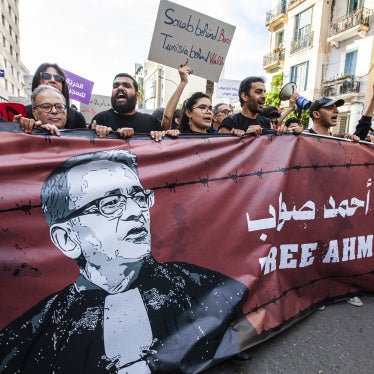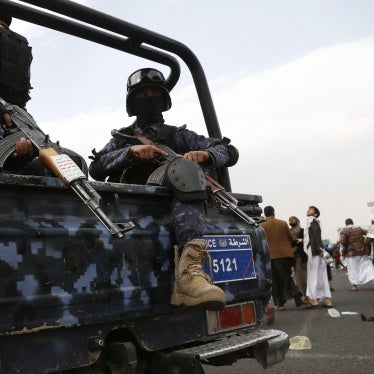In light of the upcoming first EU-Algeria Association Council Meeting on 20-21st March, the undersigned organizations would like to draw your attention to three key human rights concerns, which we hope you will be able to address with the Algerian authorities.
1. The Amnesty law
On 27 February 2006, Algeria’s full cabinet, with President Abdelaziz Bouteflika presiding, approved the “Decree Implementing the Charter for Peace and National Reconciliation”, bypassing a debate in parliament, which was not in session. The full text of the law was not disclosed before its adoption.
The measures include extending a blanket amnesty to the security forces and seemingly also to state-armed militias, while widening previous partial amnesties for members of armed groups, all of whom have committed crimes under international law and other grave human rights abuses that so far have not been investigated.
We believe that the proposed new measures amount to a denial of truth and justice to the victims of the abuses and their families. They will bar victims and their relatives from seeking justice in Algeria and prevent the truth of these abuses from emerging through Algerian courts. These measures, which extend to crimes against humanity and other grave abuses, contravene international law. The European Union must ask the Algerian authorities to investigate such abuses, hold their perpetrators accountable and provide victims judicial remedies.
We would like to refer to the Conclusions of the UN Committee on Human Rights, which, as early as 1998, expressed its deep concern regarding the massacres and extra-juridical executions that occurred in Algeria, calling for the events to be duly investigated and perpetrators to be brought to justice. Further, in its report to the 62nd session of the UN Commission on Human Rights, the UN Working group on Enforced or Involuntary Disappearances criticizes the Algerian authorities’ intention to withhold the truth on and bring justice to the individual cases of disappearances, restating that “disappearance is a continuing crime as long as the fate or whereabouts of the victim are not clarified”, that “perpetrators of acts of enforced disappearances cannot benefit from special amnesty laws and that mitigating circumstances can only be evoked in cases when the perpetrator has contributed to the clarification of the case”, and calling upon the Algerian authorities to uphold their obligation under Article 14 of the UN Declaration on enforced disappearances “to bring to justice all persons presumed responsible for an act of enforced disappearance”.
It is crucial that the European Union call for the full implementation of Algeria’s international obligations, as requested by UN bodies. We therefore urge the European Union to use the opportunity provided during the Association Council to express the EU’s concern that Algeria is contravening fundamental principles of international law and that the EU expects Algerian authorities to investigate and prosecute without delay all those allegedly responsible for grave human rights violations and to uphold the right of all victims of serious human rights abuses to truth, justice and full reparation, which are essential guarantees to any process of reconciliation.
2. Freedom of Expression
The signatories to this letter receive continuous information that journalists, civil society activists and government critics in Algeria are facing harassment, intimidation and the risk of imprisonment. Last year, some 18 journalists were sentenced to imprisonment on defamation charges, in many cases after complaints were filed by public officials.
The decree enacted on 27 February seeks to end not only prosecutions for crimes of the past, but even public debate about them. The decree provides for punishments of up to five years in prison for those who by speech or in writing “exploit the wounds of the National Tragedy” to tarnish the image of Algeria or the good reputation of its agents.
This provision threatens the right of victims and their families, human rights defenders, journalists and other Algerians to document, protest or comment critically on the conduct of state security forces during the years of internal conflict. It even threatens to penalize families of the “disappeared” who continue to campaign for disclosing the truth about the fate of their relatives.
This further narrows the space for freedom of expression at a time when authorities are aggressively prosecuting journalists working in privately-owned media and where state media allow virtually no dissenting views.
We call upon the EU to express strong concern that the current environment of intimidation in Algeria constitutes an infringement on freedoms of expression and of assembly. We would like you intervene within the framework of the EU Guidelines on human rights defenders and stress Algeria’s obligations to protect human rights defenders. We further call on you to urge the Algerian authorities to facilitate the prompt visit of the UN Rapporteur on freedom of expression, following his request.
3. Torture
Human rights organizations receive continued information that individuals arrested after protests were tortured or ill-treated in custody. The vast majority of allegations of torture made during 2005 and in previous years were not investigated. The UN Committee on the Rights of the Child expressed concern about a number of cases of torture and ill-treatment of children reported in previous years. The UN Special Rapporteur on torture was not invited to Algeria, despite repeated requests to visit the country since 1997.
In violation of national and international law, detainees suspected of terrorism-related activities continued to be held in a secret location during police custody and were denied the right to communicate with their families, putting them at risk of torture.
We ask the European Union to request of the Algerian Minister of Foreign Affairs that his country facilitate the visit of the UN Special Rapporteur on Torture which has been pending since 1992.
Lastly, the signatory organisations would like to take this opportunity to request the creation of a sub-committee on human rights in the framework of the Association Agreement, which would monitor the implementation of the human rights clause and human rights progresses at an expert level.
We look forward to receiving your account as to the Algerian Foreign Minister’s responses.
Yours sincerely,
Eric Sottas
OMCT
Director
Sarah Leah Whitson
Human Rights Watch
Director for the Middle East and North Africa division
Dick Oosting
Amnesty International
Director
Marc Schade-Poulsen
Euro-Mediterranean Human Rights Network
Director
Sidiki Kaba
FIDH
President
Cc:
Ministers of Foreign Affairs of European Union Member States
High Representative of the European union for the CFSP, Mr. Javier Solana
Commissioner for external relations, Mrs. Benita Ferrero-Waldner
Personal Representative of the EU SG/HR for Human Rights, Mr. Michael Matthiessen.







